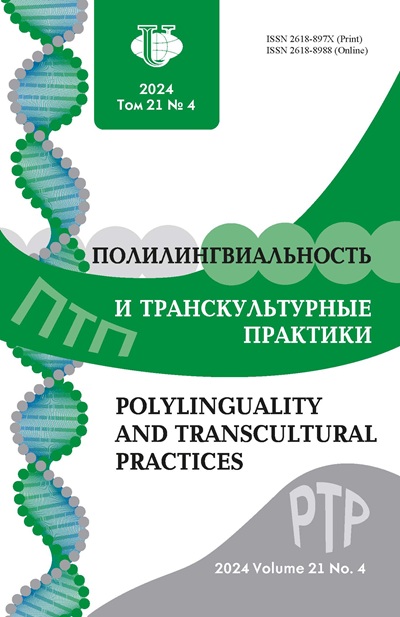Search
Issue
Title
Authors
Nikolaenko S.V.
Kovalenko A.G.
Rumyantseva N.M., Gartsova D.A.
Farisenkova L.V., Izotov K.
Chebotareva E.Y.
Maslova I.B., Gosteva Y.N.
Saranina I.I.
Orlova E.V.
Baraldo del Cerro M.L., Baghana J.
Fomenko G.N., Murashova O.V.
Krasnykh V.V.
Budiltseva M.B., Novikova N.S.
Leifa I.I.
Zakoyan L.M.
Zharkova E.H., Nazartseva E.A.
Gartsov A.D.
Alimova M.V.
Gagarina N.V.
Rudenko-Morgun O.I., Dounayeva L.A., Arkhangelskaya A.L.
Bejenari O.A.
Verbalization of the Concept of “Kysh” (Winter) in the Karachay-Balkar Language Picture of the World
Akhmatova M.A., Dodueva A.T., Ketenchiev M.B.
Mishina N.Y., Antonov E.A.
Suprun V.I.
Khukhuni G.T., Valuitseva I.I.
Dianova L.P.
Agmanova A.Y., Asmagambetova B.M.
Rudenko-Morgun O.I., Arhangel’skaja A.L., Al’-Kaysi A.N.
Maslova O.V.
Anipkina L.N.
Derbisheva Z.K.
YueBo Z.
Dolzhikova A.V., Pomortseva N.V., Kurilenko V.B., Ivanova A.S., Kulikova E.U.
Rumyantseva N.M., Yurova Y.V.
Sokolova L.I.
Kakhovskaya Y.V.
Mikheeva N.F.
Essina Z.I.
Novikova M.L.
Baghana J.
Wenqian Zang -.
Novikova A.K.
Khamraeva E.A.
Rogova A.V.
Kobilskaia I.I.
Bondarenko E.V.
Barkan A.I.
Pashkovskaya S.S.
Arkhangelskaya A.Z., Zhigunova O.M., Zhindaeva A.G.
Malysheva N.A.
Romero Intriago D.I.
Pugachev I.A., Yarkina L.P.
Rozanova S.P.
Mallaeva Z.M., Magomedov M.A., Khalidova R.S.
Baziyeva G.J., Uzdenova F.T.
Osmanzade A.O.
Kyuchukov H., Samko M.
Razumovskaya V.A., Kononova V.A.
Dzhusupov M.
Molchanova I.I.
Tumanova S.R.
Bondareva O.V.
Dagbaeva O.I.
Chzhan Uebo -.
Kozlovskaya E.S.
Saricheva E.A., Yakushev V.V.
Nedosugova A.B.
Sorokina E.V.
Saranina I.I.
Toursidou N.Y.
Banshchikova М.A.
Nazartseva E.A., Chauzova L.I.
Budiltseva M.B., Varlamova I.J., Novikova N.S.
Voropayeva Y.A.
Nevmerzhitskaya E.V.
Lizunova I.I.
Dunaeva L.A., Apakina L.V.
Alexeeva I.S.
Zhuravleva Y.A., Agmanova A.E.
Khukhuni G.T., Valuitseva I.I.
Khakuasheva M.A., Kazieva A.M.
Dzhusupov M.
Vinogradova E.N., Klobukova L.P.
Anikina M.N.
Preobrazhenskij S.J., Konovalova D.G.
Debrenne M.
Lavitski A.A.
Antonyuk E.V.
Akhnina K.V.
Baghana J.
Iakovleva S.A.
Ivanova E.N.
Kurilenko V.B., Makarova M.A.
Balykhina T.M., Cherkashina T.T.
Maslova O.V.
Alhasov Y.K.
Orlova E.V.
Novikova N.S., Budiltseva M.B.
Kiynova J.K.
Shevchenko A.V.
Baghana J., Treschova N.V.
Search tips:
- Search terms are case-insensitive
- Common words are ignored
- By default only articles containing all terms in the query are returned (i.e., AND is implied)
- Combine multiple words with OR to find articles containing either term; e.g., education OR research
- Use parentheses to create more complex queries; e.g., archive ((journal OR conference) NOT theses)
- Search for an exact phrase by putting it in quotes; e.g., "open access publishing"
- Exclude a word by prefixing it with - or NOT; e.g. online -politics or online NOT politics
- Use * in a term as a wildcard to match any sequence of characters; e.g., soci* morality would match documents containing "sociological" or "societal"











